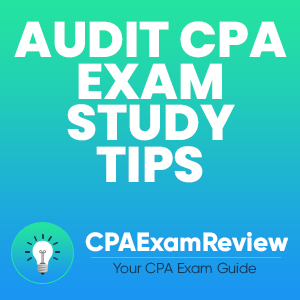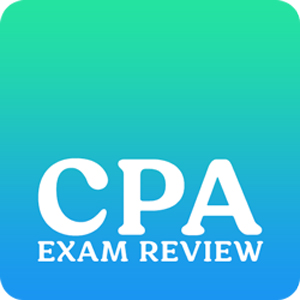 The Auditing and Attestation (AUD) section of the CPA exam is a formidable challenge that requires a solid understanding of auditing principles, standards, and practices.
The Auditing and Attestation (AUD) section of the CPA exam is a formidable challenge that requires a solid understanding of auditing principles, standards, and practices.
Success in this section demands more than just familiarity with the subject matter; it requires a strategic and well-rounded approach to studying.
This article provides 15 essential study tips to help you navigate and excel in the AUD section of the CPA exam.
15 Study Tips to Ace the AUD CPA Exam Section
Contents
- 15 Study Tips to Ace the AUD CPA Exam Section
- #1 Understand the Structure and Content of AUD
- #2 Create a Structured Study Plan
- #3 Focus on Understanding, Not Memorization
- #4 Use Multiple Study Resources
- #5 Practice with Multiple-Choice Questions
- #6 Master Auditing Standards
- #7 Deep Dive into Internal Controls
- #8 Understand Risk Assessment and Management
- #9 Utilize Practice Simulations
- #10 Study Ethics and Professional Responsibilities
- #11 Join Study Groups or Forums
- #12 Regularly Review and Revise
- #13 Take Timed Practice Exams
- #14 Stay Informed on Current Auditing Trends
- #15 Take Care of Your Mental and Physical Health
- Bottom Line
- Frequently Asked Questions
- What Are the Key Topics I Should Focus on When Studying for the AUD Section of the CPA Exam?
- How Can I Effectively Prepare for the Task-Based Simulations in the AUD Exam?
- Are There Any Specific Study Techniques That Are Particularly Useful for the AUD Exam?
- How Much Time Should I Allocate to Studying for the AUD Section, and How Should I Schedule My Study Plan?
#1 Understand the Structure and Content of AUD
The AUD exam is structured to test your knowledge and understanding of auditing procedures, generally accepted auditing standards, and other related topics. It includes multiple-choice questions and task-based simulations that assess your ability to apply auditing principles in real-world scenarios.
Familiarize yourself with the specific topics covered, such as ethics, risk assessment, internal controls, and evidence evaluation, to guide your study focus.
#2 Create a Structured Study Plan
An organized study plan is crucial for covering the vast array of topics in the AUD exam. Break down the syllabus into manageable sections and allocate specific times for each topic.
Ensure your plan includes regular review sessions and allows flexibility to adapt as needed. A structured approach ensures comprehensive coverage and helps maintain consistent progress.
#3 Focus on Understanding, Not Memorization
Understanding the underlying principles and concepts in auditing is more effective than rote memorization.
Focus on grasping the ‘why’ behind auditing standards and practices. This deeper understanding aids in applying knowledge to various question types and scenarios you’ll encounter on the exam.
#4 Use Multiple Study Resources
Leverage a variety of study materials to enhance your learning. Textbooks, review courses, online tutorials, and video lectures can provide different perspectives and explanations of complex topics.
Diversify your study resources to reinforce learning and to suit different learning styles.
#5 Practice with Multiple-Choice Questions
Regular practice with multiple-choice questions is essential. This not only helps reinforce your knowledge but also improves your test-taking skills, such as question analysis and time management.
Use practice questions to identify areas of strength and weakness, and adjust your study plan accordingly.
#6 Master Auditing Standards
A thorough understanding of auditing standards is fundamental for the AUD exam. Focus on the key standards, their objectives, and applications.
Develop strategies to remember these standards, such as summarizing them in your own words or using mnemonic devices.
#7 Deep Dive into Internal Controls
Internal controls are a significant component of the AUD exam. Understand the types of controls, their purposes, and how they relate to risk assessment and audit procedures.
Practice applying these concepts to different scenarios, as you might encounter in task-based simulations.
#8 Understand Risk Assessment and Management
Risk assessment and management are crucial in auditing. Familiarize yourself with the process of identifying, assessing, and responding to audit risks. Study how different types of risks affect audit plans and strategies.
#9 Utilize Practice Simulations
Task-based simulations mirror real-world auditing tasks and are a key component of the AUD exam. Utilize practice simulations to get accustomed to the format and to apply your theoretical knowledge in practical settings.
These simulations enhance problem-solving skills and help you understand the application of auditing standards.
#10 Study Ethics and Professional Responsibilities
Ethics and professional responsibilities are integral to the AUD exam and the auditing profession.
Pay special attention to the AICPA Code of Professional Conduct and other ethical guidelines relevant to auditors. Understanding these principles is crucial for both the exam and your future career.
#11 Join Study Groups or Forums
Participating in study groups or online forums can provide support and additional insights. Discussing topics with peers can deepen your understanding and offer new perspectives.
Collaborative learning can also be motivational and provide a sense of community during your preparation journey.
#12 Regularly Review and Revise
Consistent review and revision are key to retaining information. Regularly go back to previously studied topics to reinforce learning.
Use different revision techniques, like summarizing notes, creating mind maps, or teaching concepts to someone else, to enhance memory retention.
#13 Take Timed Practice Exams
Timed practice exams are invaluable for preparing for the actual test day. T
hey help you practice managing time effectively and give you a sense of the exam’s pacing. Analyze your performance on these exams to identify areas that need more focus and to fine-tune your exam strategy.
#14 Stay Informed on Current Auditing Trends
Staying updated with the latest trends and developments in auditing can provide an edge in your exam preparation.
Current issues often find their way into exam questions, and being knowledgeable in these areas can benefit you. Follow industry news, read professional journals, and participate in relevant webinars or seminars.
#15 Take Care of Your Mental and Physical Health
Maintaining your mental and physical well-being is crucial during the intense preparation period. Ensure you get enough rest, eat healthily, and engage in physical activities to relieve stress.
Remember to take regular breaks and balance your study schedule with relaxation and leisure activities.
Bottom Line
Preparing for the AUD section of the CPA exam is a demanding but achievable task. By implementing these 15 study tips, you can build a strong foundation in auditing principles and enhance your chances of success.
Remember, passing the CPA exam requires perseverance, dedication, and a strategic approach to learning. Embrace the challenge, stay committed to your goals, and the rewards of achieving CPA certification will be well worth the effort.
Frequently Asked Questions
What Are the Key Topics I Should Focus on When Studying for the AUD Section of the CPA Exam?
When studying for the AUD section of the CPA exam, focus on key topics such as auditing standards, audit reports, internal controls, risk assessment, and ethics in auditing.
Understanding the principles and procedures of auditing, including the evaluation of evidence and the documentation process, is also crucial. Make sure to grasp the concepts related to different types of audits and attestation engagements for a well-rounded preparation.
How Can I Effectively Prepare for the Task-Based Simulations in the AUD Exam?
To effectively prepare for the task-based simulations in the AUD exam, practice with as many simulation examples as possible. Familiarize yourself with different formats of simulations, including research questions, document review, and completing reports.
Focus on applying auditing standards to practical scenarios and develop a thorough understanding of how to analyze and interpret financial data and audit documentation.
Are There Any Specific Study Techniques That Are Particularly Useful for the AUD Exam?
For the AUD exam, active learning techniques are particularly useful. These include creating summary notes, engaging in discussions with peers or study groups, and teaching concepts to others.
Practice applying auditing standards to hypothetical scenarios, and utilize flashcards for memorizing key auditing terms and principles. Regularly completing practice questions and reviewing explanations for both correct and incorrect answers can also significantly enhance your understanding.
How Much Time Should I Allocate to Studying for the AUD Section, and How Should I Schedule My Study Plan?
The amount of time needed to study for the AUD section varies depending on your background and understanding of auditing concepts. Typically, candidates allocate 70-100 hours of study time for AUD.
It’s important to create a balanced study plan that covers all topics, with more time devoted to areas you find challenging. Incorporate a mix of reading, practice questions, and simulations into your schedule, and ensure to have regular review sessions to reinforce the material.

